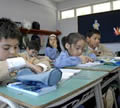- Reunión inter-regional de expertos sobre la medición de la cooperación Sur-Sur
- La SEGIB lanza newsletter con nuevas historias sobre cooperación sur-sur y triangular
- ¿Cuál es el valor de las universidades públicas hoy en Argentina?
- Una cumbre empresarial entre Corea del Sur y América Latina tendrá lugar esta semana
- Cuba en la Cooperación Sur-Sur: el camino para la integración
- Good Practices in South-South and Triangular Cooperation for Sustainable Development – Volume 4
- Global South-South Development Expo 2022 Concept Note
- Cooperación Sur-Sur en América Latina en tiempos de pandemia
- Valoración de la cooperación Sur-Sur en seis países seleccionados de América Latina y el Caribe: desafíos compartidos en la implementación de la Agenda 2030 para el Desarrollo Sostenible
- Desarrollo en transición: propuesta de concepto y medición para una cooperación renovada en América Latina y el Caribe
SELA has much to contribute to the CELAC, through its experience of over 30 years in the areas of cooperation.
Published by Prensa Latina, via Google News
Havana, January 22 (PL)- The cooperation between the Latin American and Caribbean Economic System (SELA) and the CELAC would help to strengthen regional integration in economic terms, considered here the professor of the Research Center of International Economics, Antonio Romero.
According to the specialist, SELA has much to contribute to the Community of Latin American and Caribbean States (CELAC), through its experience of over 30 years in the areas of cooperation.
SELA, founded in 1975, has been the focal point of collaboration between Latin American and Caribbean countries, it would be ideal the convergence with the young organization CELAC, which will hold its first summit on January 27 in Santiago de Chile.
Especially, it can help to define some of the central themes of the programmatic platform of CELAC-founded in Venezuela in December 2011 - at the confluence of the 33 independent states which are part of the area, said Romero.
The collaboration between the two agencies is central to the challenge of consolidating regional integration in economic terms without ignoring the asymmetries between the countries of the area, said the scholar in an interview with Prensa Latina.
The challenge is to integrate different kinds of nations in economic terms as those where there are large and diversified economies such as Brazil and Mexico, and other small and vulnerable economies such as islands of the eastern Caribbean, said the interviewee.































